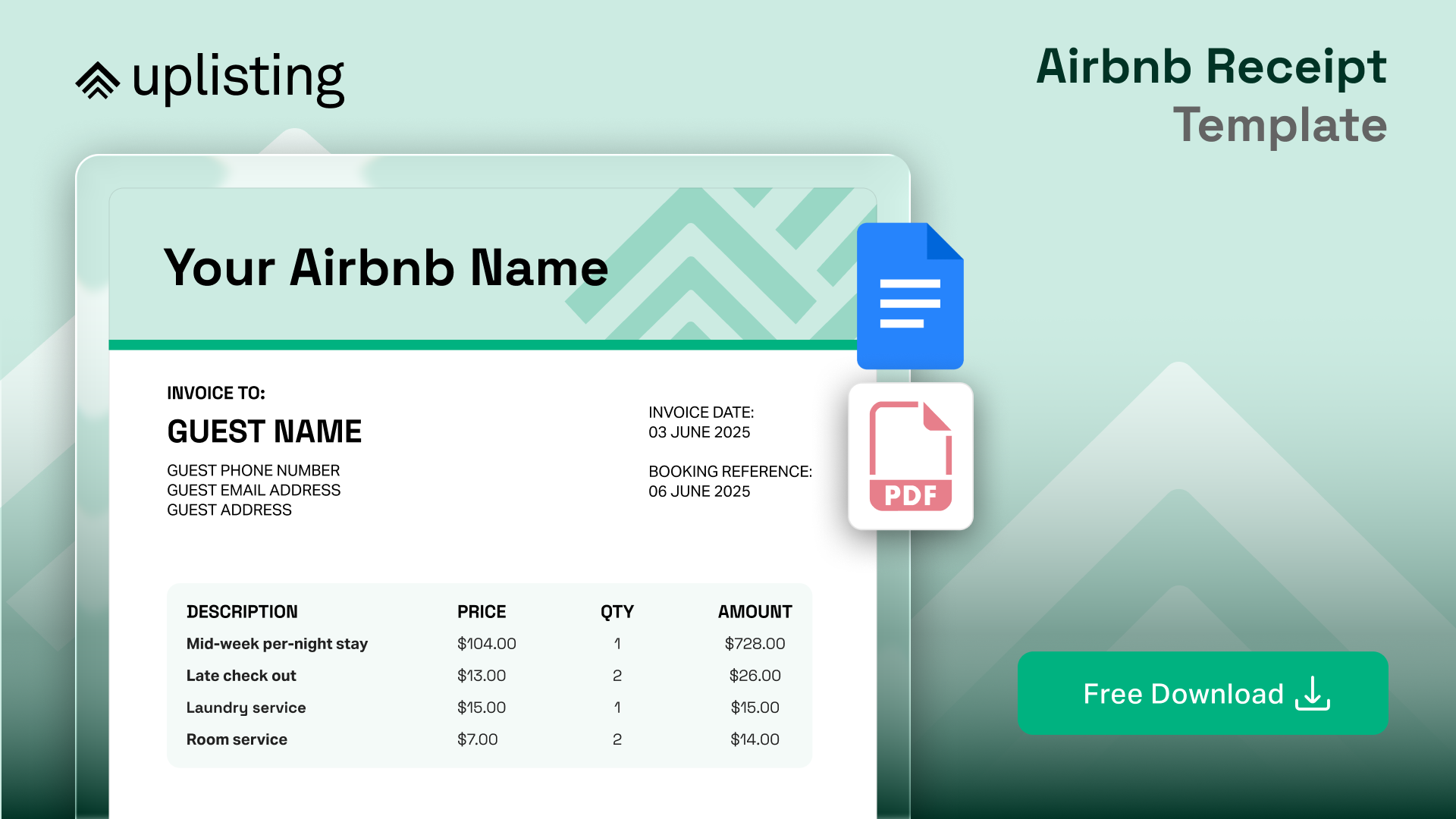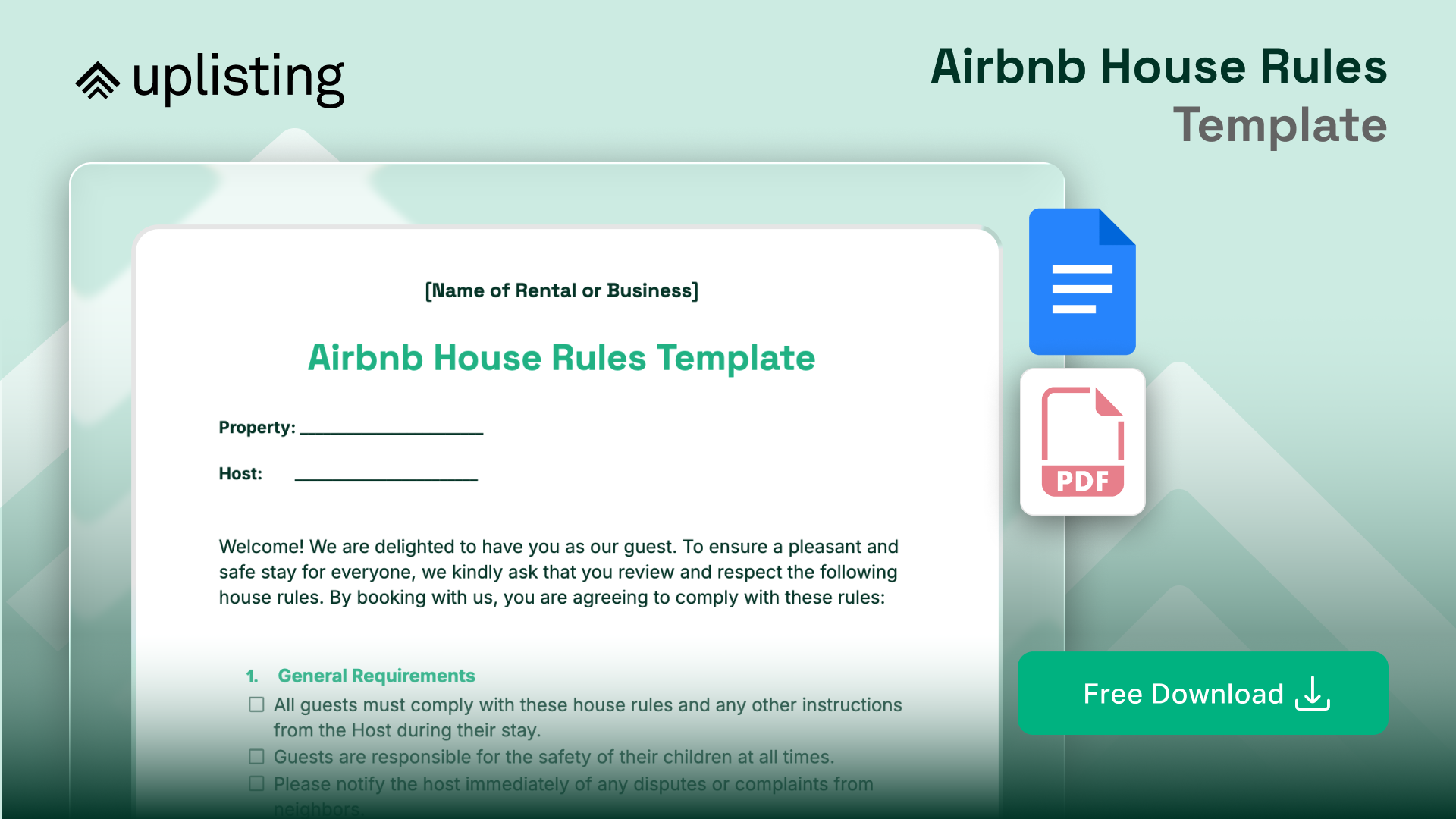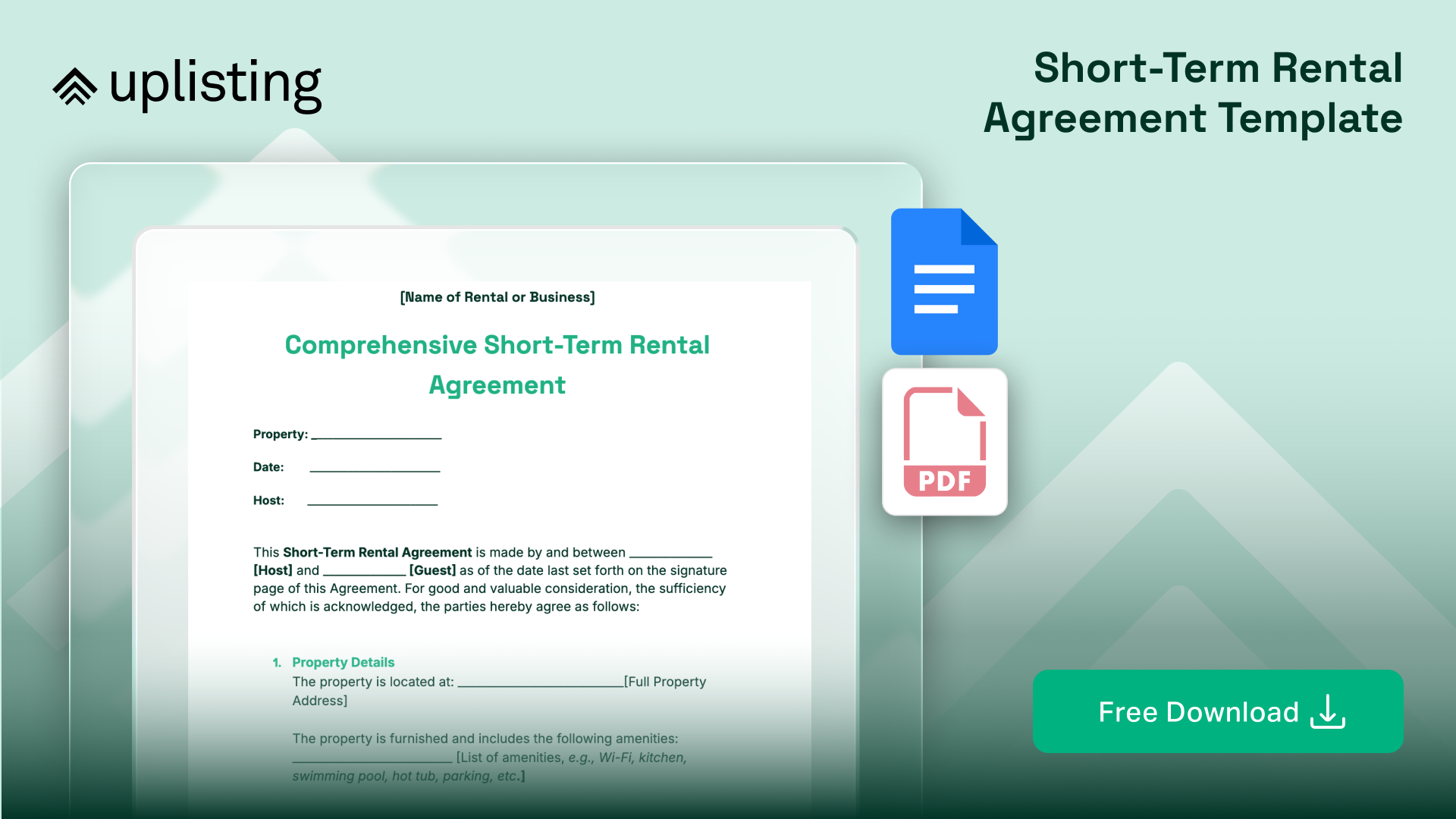Key Takeaways
Regular home insurance won’t cover short-term guests, so you’ll need a specialized vacation rental insurance policy that accounts for commercial use and guest turnover
The best vacation rental insurance plans include liability coverage, income protection, and coverage for guest-related damage or cancellations
Pairing insurance with a reliable property management system like Uplisting helps hosts automate guest screening, reduce risk, and maintain full control over their operations
It’s the message every host dreads.
A guest calls at midnight to say a pipe burst in the kitchen. Or worse, you wake up to a notification that your guests accidentally started a fire trying to light the patio heater. Suddenly, that calm “set it and forget it” booking becomes a full-blown emergency.
For many hosts, that’s the moment they realise their regular home insurance doesn’t cover vacation rentals. It’s a tough (and expensive) lesson: standard homeowner policies often exclude short-term stays, meaning accidental damage or guest injuries can turn into thousands of dollars out of pocket.
But here’s the good news: vacation rental insurance has evolved fast. The best providers today offer specialised coverage built for hosts, from property damage and liability protection to loss of income when a booking gets cancelled.
And unlike a few years ago, these policies aren’t buried in fine print or impossible to claim. Many are now designed for Airbnb, Vrbo, and direct-booking hosts who manage properties professionally, offering peace of mind without cutting into profits.
In this article, we’ll break down how vacation rental insurance actually works, what it covers, and the best options trusted by experienced hosts. Whether you manage one coastal cottage or twenty city apartments, you’ll learn how to protect your property (and your income) from the unexpected, with real insight from the hosts who’ve been there.
What Is Vacation Rental Insurance?
Vacation rental insurance is a specialized type of coverage designed for rental properties listed on short-term rental platforms like Airbnb, Vrbo, and Booking.com.
Unlike a standard homeowners or landlord policy, this insurance is built for the realities of hosting paying guests. It protects against common risks such as accidental property damage, liability claims, lost income, and other guest-related incidents.
In simple terms, the right short-term rental insurance the safety net every host needs, covering the gaps that traditional home insurance won’t, and helping you keep your rental business running smoothly even when the unexpected happens.
All-in-one Vacation Rental Software and Channel Management System
Get started in seconds by connecting Airbnb
Manage short-term rentals & bookings, message guests, take payment, and so much more. All in one easy-to-use platform (that never double-books).
Why Specialized Vacation Rental Insurance Is a Non-Negotiable
Standard homeowners insurance rarely covers short-term rental chaos.
If you’ve ever hosted guests for more than a weekend, you know that even the most well-intentioned travelers can cause costly damage. A broken window, a flooded bathroom, or an injured guest can quickly turn what should’ve been a profitable booking into an expensive nightmare.
Standard homeowners insurance isn’t built for that. Most policies specifically exclude short-term rental activity, leaving hosts without coverage when something goes wrong during a stay. That means if a guest slips on a wet floor or accidentally sets off the sprinkler system, you could be responsible for every repair bill and liability claim yourself.
Vacation rental insurance fills those gaps. It protects both you and your guests, covering property damage, theft, accidental injuries, and even lost income from canceled stays. Some plans even include coverage for cleaning fees, vandalism, or legal expenses if a guest files a claim.
In short, it’s more than a safety precaution. It’s a smart business move. When your property is protected, you can focus on hosting confidently, knowing that one small mistake won’t lead to a major financial setback.

Top 8 Policies for Short-Term Rentals
Finding the right insurance as a vacation rental host can feel like comparing apples, oranges, and pineapples. Every provider promises “comprehensive coverage,” but few truly understand the short-term rental model.
Below, we’ve broken down ten leading insurance options, highlighting what they do best, how much they cost, and who they’re really designed for.
1. Proper Insurance
Best for: Full-time Airbnb hosts who want commercial-grade protection
Proper Insurance is widely recognized as the most comprehensive short-term rental policy on the market. Backed by Lloyd’s of London, it’s specifically designed to replace a standard homeowners or landlord policy with true commercial-grade coverage.
It covers the building, contents, and loss of business income, even amenities like pools, hot tubs, and bicycles. Hosts praise Proper’s fast, transparent claims process and dedicated support team, often resolving issues within a week
Pros and Cons
Pros | Cons |
|---|
Commercial-grade policy designed for STRs | More expensive than standard homeowners insurance |
Backed by Lloyd’s of London | Operates as a broker, not a direct insurer |
Excellent customer service and fast claim resolution | Premiums can be higher depending on property size |
Nationwide coverage | Pricing transparency varies by location |
Key takeaway: Ideal for professional hosts who want the same level of protection as a business owner — not just a homeowner renting part-time.
2. Safely
Best for: Hosts who want per-booking coverage and guest screening combined
Safely offers a pay-per-booking model that merges insurance with guest screening. It provides up to $1 million in coverage per stay, protecting against both property damage and liability claims.
The integrated screening system helps prevent risky bookings before they happen — a major advantage for busy hosts running multiple listings. Safely also integrates with major Property Management Systems (PMS) like Uplisting, automating guest protection without the paperwork
Pros and Cons
Pros | Cons |
|---|
Flexible pay-per-booking structure | Limited user reviews compared to larger insurers |
Includes guest screening to prevent bad stays | Some reports of slow screening turnaround |
Simple claims process with user-friendly portal | Coverage starts only after guest vetting approval |
Integrates with PMS platforms | Relatively new player in the market |
Key takeaway: A modern, data-driven choice for hosts who value both prevention and protection.
3. InsuraGuest
Best for: Hosts seeking an affordable add-on to existing policies
InsuraGuest provides an easy way to layer guest protection on top of your current insurance. Designed for hosts, hotels, and vacation rental managers, it covers guest-caused damage and injuries without requiring you to switch carriers.
Policies range from $69–$99 per month or around $3 per day, and can be passed through as a guest fee. It’s a “no-fault, first-payor” system, meaning claims are handled quickly regardless of who’s responsible
Pros and Cons
Pros | Cons |
|---|
Affordable monthly or daily plans | Less comprehensive than full STR policies |
Integrates with existing insurance coverage | Primarily designed for hospitality industry |
Covers guest injury and damage up to $25,000 | Limited host-specific testimonials |
Quick no-fault payout structure | Mixed reviews about claims responsiveness |
Key takeaway: A cost-effective, flexible option for hosts wanting extra protection without overhauling existing insurance.
4. CBIZ Vacation Rental Insurance
Best for: Professional hosts managing multiple or high-value properties
CBIZ has specialized in vacation rental insurance since 2002, offering bundled protection that includes property, contents, and liability coverage. Backed by an AA+ financial strength rating from A.M. Best, CBIZ caters to property managers and experienced hosts who need commercial-grade reliability.
While it’s more expensive than a standard policy, its coverage extends nationwide with no minimum occupancy requirements, ideal for hosts who manage a mix of seasonal and year-round rentals
Pros and Cons
Pros | Cons |
|---|
Commercial-grade coverage from experienced broker | Higher premiums than homeowners insurance |
Includes property, contents, and liability coverage | Limited online reviews |
Strong financial stability (AA+ rating) | Must contact broker for a quote |
Nationwide availability | Complex for single-property hosts |
Key takeaway: The best fit for established hosts who treat short-term rentals as a serious business investment.
5. Allstate HostAdvantage
Best for: Casual hosts who rent their home part-time
Allstate HostAdvantage is an add-on (endorsement) for existing Allstate homeowners policies. It provides coverage for theft, liability, and loss of income during guest stays. Perfect for those who rent occasionally rather than full-time.
With average annual costs between $300–$800, it’s affordable and easy to manage through your existing Allstate agent. While coverage limits are lower than specialized STR policies, the convenience makes it attractive for newer hosts
Pros and Cons
Pros | Cons |
|---|
Convenient add-on for current Allstate customers | Only available to existing policyholders |
Covers theft, loss of income, and liability | Limited compared to STR-specific plans |
Competitive pricing for occasional rentals | Coverage caps around $10,000–$15,000 |
Backed by trusted national insurer | Mixed reviews for broader Allstate service |
Key takeaway: Great for part-time or first-time hosts who already have Allstate coverage and want basic Airbnb protection.
6. American Family Insurance
Best for: Homeowners renting seasonally or under 62 days per year
American Family Insurance offers a short-term rental endorsement for homeowners who rent their property for fewer than 62 days annually. It’s a customizable, scalable policy that protects against vandalism, theft, property damage, and liability, with excellent customer service ratings across the board
This option is ideal for occasional hosts, families renting out vacation homes, or landlords testing the STR market.
Pros and Cons
Pros | Cons |
|---|
Customizable short-term rental add-on | Coverage capped at 62 rental days per year |
Excellent reputation for service and reliability | Not available in all states (only 19) |
Covers damage, theft, and guest injuries | Not a standalone STR policy |
Strong financial stability (A.M. Best rating) | Limited STR-specific testimonials |
Key takeaway: Reliable, flexible coverage for part-time hosts who rent occasionally but still want proper protection.
7. Travel Guard
Best for: Hosts who want to protect guest bookings and reduce disputes
Travel Guard isn’t host insurance; it’s travel insurance for guests. But recommending it to travelers helps hosts safeguard revenue by reducing refund requests and disputes caused by trip cancellations or medical emergencies.
Policies include trip interruption, cancellation, and medical coverage, plus 24/7 assistance worldwide
Pros and Cons
Pros | Cons |
|---|
Protects hosts indirectly through guest coverage | Guest must purchase the plan separately |
Excellent emergency response and claims handling | Not host-focused insurance |
24/7 customer support and global assistance | Mixed reviews for corporate response times |
Reduces cancellations and disputes | Primarily traveler-facing product |
Key takeaway: A smart add-on recommendation for hosts — when guests are protected, your payouts are safer too.
8. Nationwide
Best for: Homeowners seeking a trusted, all-around insurer
Nationwide offers a dedicated vacation rental property insurance policy, making it one of the few mainstream insurers with a product tailored for hosts. It covers vacant homes, short-term rental activity, and property used as a business.
While it’s less specialized than companies like Proper or CBIZ, its reputation and financial strength make it a dependable choice for homeowners who want simplicity and name-brand reliability
Pros and Cons
Pros | Cons |
|---|
Well-established, financially stable insurer | Limited STR-specific features |
Separate vacation rental policies available | Pricing not transparent online |
Covers vacant and business-use properties | More expensive than regular home policies |
Nationwide availability | Few host testimonials available |
Key takeaway: A safe, recognizable choice for traditional homeowners entering the short-term rental space.
You’re in great company
Sign up
Some of the largest short-term rental operators (with 250+ properties) rely on Uplisting's software to scale their businesses.
What to Look For in Vacation Rental Insurance
Before you choose a provider, it helps to understand what truly matters in a short-term rental policy. The best insurance isn’t always the cheapest; it’s the one that fits how you host, how often guests stay, and what risks you’re most likely to face. Here’s what to keep an eye on before you commit.
1. Coverage scope
Look beyond property damage. A strong vacation rental policy should include:
Liability protection in case a guest gets injured or damages neighboring property.
Loss of income coverage if your home can’t be rented after an insured event like a fire or flood.
Guest damage protection for broken furniture, appliances, or vandalism.
Amenity coverage for things like pools, bikes, or hot tubs, which are features that standard insurers often exclude.
Comprehensive coverage ensures you’re protected whether a pipe bursts, a guest slips on the deck, or your property becomes uninhabitable for a few weeks.
2. Host-specific terms
Many standard homeowner or landlord policies explicitly exclude commercial or short-term rental activity. That means if you rely on a regular plan, your claim could be denied the moment an insurer learns you’re renting to paying guests.
Instead, choose a dedicated short-term rental policy that clearly lists Airbnb, Vrbo, and other booking platforms as eligible uses.
3. Flexibility and scalability
If you manage multiple listings or plan to expand, look for providers that offer portfolio coverage or allow you to easily add new properties under one account. Some companies, like Proper Insurance or American Family, let you scale your protection as your business grows, saving you from juggling multiple renewals.
4. Per-booking vs. annual pricing
Different insurance models suit different types of hosts:
Pay-per-booking plans (like Safely or InsuraGuest) are great for casual or seasonal hosts who only rent part of the year.
Annual commercial policies work better for full-time hosts who need round-the-clock coverage without tracking every reservation.
Evaluate your occupancy rate and booking volume before deciding which model makes the most sense financially.
5. Ease of claims and customer support
When things go wrong, response time matters. Choose a company with 24/7 claims support, online filing tools, and positive reviews from other hosts.
It’s worth reading testimonials or checking host communities on Facebook or Reddit, claims experience can vary widely between insurers.
6. Integration with your hosting tech
Many modern insurers now integrate with property management systems (PMS) like Uplisting, Hostfully, or Guesty. This lets you automatically trigger coverage for new bookings and simplifies documentation when you need to make a claim.
A Final Word On Vacation Rental Insurance Coverage
Vacation rental insurance is all about protecting the business you’ve worked hard to build. From accidental damage to guest injuries or lost income after a storm, even one unexpected event can cost thousands if you’re not covered properly.
The good news is that today’s insurance options are designed with hosts in mind. Whether you prefer per-booking flexibility from providers like Safely or the full commercial protection offered by Proper Insurance, the right plan can help you focus on what truly matters: running a smooth, profitable hosting business.
Pair that protection with smart automation, and your setup becomes nearly effortless. With Uplisting, you can centralize guest communication, automate check-in messages, and sync bookings across platforms, giving you fewer surprises, happier guests, and more time to grow your rental portfolio.
Because when your property is protected and your operations run like clockwork, hosting stops feeling like a gamble and starts feeling like a business built to last. Ready to level up your short-term rental business with less stress? Sign up for Uplisting today, and see the difference that automation and control can make.
Enjoy the confidence & focus you need to scale your vacation rental business
Book more while doing less
With a reliable VRM solution you can trust, Uplisting can help you grow your business without wasting time on double bookings, unhappy guests, upset clients and worrying what could go wrong next.
FAQs About Vacation Rental Insurance
Does homeowner insurance cover short-term rentals?
Most homeowner insurance policies won’t protect you when you host paying guests.
Providers usually exclude short-term rental activity, so if a guest damages your property or gets injured, you’re often left without support. A dedicated vacation rental insurance policy fills those gaps and gives you coverage designed for hosting.
Can I rely on credit card coverage for guests?
Credit card travel protections rarely work for hosts.
Coverage usually helps with the cardholder’s trip cancellations, lost luggage, or medical emergencies, but skips property damage or guest-caused problems. Relying on a credit card for guest coverage leaves you exposed, so look for the best vacation rental insurance designed with short-term rental owners in mind.
Are there premium discounts for multiple properties?
Insurance providers typically offer premium discounts when you add more than one property under the same owner or entity.
Bundling policies can save money and time, since you manage renewals and paperwork in one place. Always ask about multi-property rates when setting up coverage.
When is the best time to purchase coverage?
Buying vacation rental insurance at the time of booking or as soon as your calendar opens for reservations gets you the broadest protections. Early purchase makes you eligible for valuable add-ons like Cancel For Any Reason (CFAR) and pre-existing condition waivers. Delaying your policy can mean missing out on options that matter when plans shift.

















.png)

